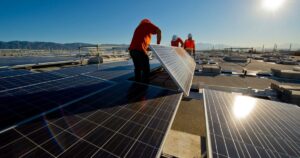
As 2023 winds down, a variety of positive outcomes — a recession that didn’t happen, strong public support for reproductive freedoms and incremental advances in climate policies — must compete for public attention with a new nasty war in the Middle East and a continuing one in Ukraine.
2024 thus promises to be a consequential year with five major sustainability concerns at the forefront:
What role will fossil fuels continue to play in the mix of global energy supplies?
This question represents a central debate at COP28 and beyond. Based upon current industry projections, virtually all of the top-20 producing nations plan to extract more oil, gas and coal in 2030 than they do today. ExxonMobil’s recent purchase of Pioneer Natural Resources for $60 billion and Chevron’s acquisition of Hess Corp. for $53 billion has solidified the belief that an industry flush with cash will continue to invest in what it knows best. A closer look at these acquisitions, however, reveals that they will be unlikely to appreciably add to global fossil fuel reserves but, rather, will strengthen cash flow for stock buybacks and dividend payments. Investors in both companies reacted negatively to the acquisitions for a very basic reason — adding reserves through acquisition reveals less confidence in the industry’s future by its own CEOs.
Earlier this year, by contrast, ExxonMobil purchased drilling rights for lithium production on 120,000 acres in southwest Arkansas and announced that it aims to become a major U.S. supplier for battery manufacturing by 2030. We can expect similar moves by other major fossil fuel producers as they assess the global marketplace — and the politics — that shape future investment strategies. Meanwhile, both pricing and market penetration of renewable energy and energy efficiency technologies move inexorably forward in competing with hydrocarbon fuels. The pace of this transition will be slower than sustainability advocates desire, but the inevitability of this change is reaching market scale.
Will the transition to electric vehicles take longer than expected?
The factors in play for a market transformation from internal combustion to electrified vehicles have become increasingly complex for auto manufacturers, their supply chains, policymakers and consumers. Global electric vehicle (EV) sales rose 49 percent in the first half of this year, a decline from 63 percent in 2022. The rate of EV sales growth in the U.S. is also slowing. In response, U.S. automakers have scaled back some of their plans for pickup truck and other factories and battery manufacturing facilities. Many car dealers, because of a lack of technical knowledge or economic incentives, are also exhibiting reluctance to promote EVs.
The Biden administration’s support of EV manufacturing is based upon mitigating climate change, but its policies also aim to rebuild the middle class through higher-paying manufacturing jobs. The United Auto Workers (UAW) union has balked at a Biden reelection endorsement because of job security concerns from expanded EV production. Substantially fewer workers and parts are required for EVs than for internal combustion vehicles, and many vehicles and batteries will be manufactured in non-union states. Expect the administration to support the UAW’s efforts to unionize more workers, while adhering (at least through the election) to the Environmental Protection Agency’s (EPA) proposed regulatory deadlines that two-thirds of all new passenger cars sold by 2032 be electrified.
Will the Supreme Court overturn the Chevron Deference?
After a successful 50-year campaign to overturn Roe v. Wade, conservative legal advocates are gunning to dethrone what is perhaps the most consequential administrative law ruling in the history of U.S. jurisprudence known as the “Chevron Deference.” The essence of the Chevron Deference, decided by the Supreme Court in 1985, is as follows: If Congress has not written specific instructions for implementing legislation, then courts should determine if an agency’s legal interpretation is “reasonable.” If courts concur, they should then “defer” to the agency’s decision and not substitute a separate interpretation. At stake in the decision are the regulatory authorities and processes that have been in place for nearly 50 years to protect health, environmental and occupational safety; ensure food and pharmaceutical quality; regulate the quantity of fishing harvests; and prevent financial irregularities by banks and investors. EPA’s efforts to limit greenhouse gas emissions from power generation and transportation sources will be centrally affected by this ruling.
Given the strong political backlash against the reversal of Roe v. Wade, the Supreme Court — already hugely unpopular with the American public — will likely conduct its deliberations through both a legal and a political lens. Whether the court overturns the Chevron Deference or constrains its application — there is no good outcome under either option — the consequences for policymakers and citizens will be enormous as basic health, environmental and other protections will need to be re-proposed by agencies or re-enacted by a dysfunctional Congress, a process that will take years if not decades.
Will geopolitical conflicts affect climate change, biodiversity and other priority sustainability concerns?
The answer is yes. Advancements in sustainability policies and commitments are most likely to occur in times of political and economic stability across major nations and regions. The best recent example of such progress occurred in the 2015 Paris Agreement when the leadership of China, the U.S., the European Union and other leading nations personally negotiated a goal to constrain future warming to 1.5 degrees Celsius. In contrast, the present international system is ravaged by military, economic and political conflicts that involve the world’s major powers.
The consequences of geopolitical conflicts upon sustainability priorities are direct and immediate. They include: senior-level policymakers must devote significant time and political capital to containing the risks of wars and refugee resettlements rather than focusing upon accelerating climate change and other needs; the vast expenditures for arming and resupplying protagonists on all sides of military conflicts directly constrain the availability of funding for biodiversity protection, climate change adaptation and mitigation, and investments in new technologies in developing nations; geopolitical instabilities worsen existing insecurities (rather than diversifying beyond fossil fuel consumption, nations conclude that they need to better maintain the security of their existing oil, gas and coal supplies); and collaboration among nations becomes more difficult during times of rising geopolitical tensions.
Will Generation Z and other voters continue their expanded political participation?
The most impactful decision Gen Z can make in 2024 is to vote in national and local elections. This is true not only for the U.S. but across the globe where 76 elections will be held next year, 43 of them free and fair. More than one-half of humanity will have the opportunity to vote in such countries as India, Indonesia and the U.S. Of these, the U.S. election will shape the world.
Record levels of Gen Z voters turned out for American national elections in 2018 and 2020. Their high level of electoral participation has continued through a series of voter referenda and other contests in which protecting a woman’s access to abortion was a central issue. To further motivate Gen Z voters, candidates will need to remind them of the impacts of their votes on climate change, reproductive rights, voting rights and their role as a major voice in strengthening democracy.
In a culturally and politically divided country, every year is a difference-maker. This is especially true of 2024 as military conflicts rage, time frames for solving major challenges (such as climate change) narrow and trust is low between citizens and policymakers. Achieving progress for each of 2024’s big sustainability questions can build public confidence and political momentum for taking even bolder steps in the future.
- SEO Powered Content & PR Distribution. Get Amplified Today.
- PlatoData.Network Vertical Generative Ai. Empower Yourself. Access Here.
- PlatoAiStream. Web3 Intelligence. Knowledge Amplified. Access Here.
- PlatoESG. Carbon, CleanTech, Energy, Environment, Solar, Waste Management. Access Here.
- PlatoHealth. Biotech and Clinical Trials Intelligence. Access Here.
- Source: https://www.greenbiz.com/article/5-big-questions-driving-sustainability-2024
- :has
- :is
- :not
- :where
- 000
- 1
- 120
- 1985
- 2015
- 2018
- 2020
- 2022
- 2023
- 2024
- 2030
- 43
- 49
- 50
- 50 Years
- a
- accelerating
- access
- achieving
- acquisition
- acquisitions
- acres
- across
- adaptation
- add
- adding
- adhering
- administration
- administrative
- advancements
- advances
- advocates
- affect
- affected
- against
- agencies
- agency
- Agreement
- aim
- aims
- All
- already
- also
- American
- among
- an
- and
- announced
- answer
- Application
- ARE
- arkansas
- AS
- assess
- At
- attention
- Authorities
- auto
- automakers
- availability
- Banks
- based
- basic
- batteries
- battery
- BE
- because
- become
- becomes
- been
- belief
- BEST
- Better
- between
- Beyond
- biden
- Big
- Billion
- both
- build
- but
- by
- Campaign
- CAN
- candidates
- capital
- car
- cars
- Cash
- cash flow
- Celsius
- central
- CEOs
- chains
- challenges
- change
- chevron
- China
- Citizens
- class
- Climate
- Climate change
- closer
- Coal
- collaboration
- commitments
- Companies
- compete
- competing
- complex
- Concerns
- conclude
- Conduct
- confidence
- conflicts
- Congress
- Consequences
- consequential
- conservative
- Consumers
- consumption
- continue
- continued
- continuing
- contrast
- cop28
- Corp
- countries
- country
- Court
- Courts
- culturally
- Current
- debate
- decades
- decided
- decision
- Decline
- Democracy
- desire
- Determine
- dethrone
- developing
- difficult
- direct
- directly
- divided
- dividend
- do
- down
- drilling
- driving
- during
- dysfunctional
- each
- East
- Economic
- Economist
- efficiency
- efforts
- either
- Election
- Elections
- Electric
- electric vehicle
- electric vehicles
- Emissions
- Endorsement..
- energy
- energy efficiency
- enormous
- ensure
- environmental
- Environmental Protection Agency
- EPA
- especially
- essence
- Ether (ETH)
- European
- european union
- EV
- Even
- Every
- evs
- example
- existing
- expanded
- expect
- expected
- extract
- facilities
- factories
- factors
- fair
- fewer
- financial
- First
- Fishing
- five
- flow
- focusing
- follows
- food
- For
- forefront
- Forward
- fossil
- Fossil fuel
- fossil fuels
- Free
- freedoms
- from
- Fuel
- fuels
- funding
- further
- future
- GAS
- Gen
- Gen Z
- generation
- generation Z
- geopolitical
- Global
- globe
- goal
- good
- greenhouse gas
- Greenhouse gas emissions
- Growth
- Half
- happen
- Have
- Health
- Held
- High
- history
- However
- HTML
- HTTPS
- Hugely
- Humanity
- if
- immediate
- impactful
- Impacts
- implementing
- in
- Incentives
- include
- increasingly
- incremental
- india
- Indonesia
- industry
- industry’s
- instructions
- internal
- International
- interpretation
- Invest
- investment
- Investments
- Investors
- involve
- issue
- IT
- ITS
- Job
- Jobs
- jpg
- knowledge
- known
- knows
- Lack
- Law
- Leadership
- leading
- least
- Legal
- Legislation
- Lens
- less
- Level
- levels
- likely
- LIMIT
- lithium
- local
- longer
- Look
- Low
- maintain
- major
- make
- manufactured
- Manufacturers
- manufacturing
- many
- Market
- Market Transformation
- marketplace
- Meanwhile
- Middle
- Middle East
- Military
- mitigating
- mitigation
- mix
- Momentum
- more
- most
- move
- moves
- must
- National
- Nations
- Natural
- nearly
- Need
- needs
- negatively
- negotiated
- New
- New technologies
- next
- no
- occupational
- occur
- occurred
- of
- Oil
- on
- ONE
- only
- Opportunity
- Option
- or
- Other
- out
- Outcome
- outcomes
- own
- Pace
- paris
- Paris Agreement
- participation
- parts
- payments
- penetration
- percent
- perhaps
- Personally
- Pharmaceutical
- Pickup
- pioneer
- Place
- plans
- plato
- Plato Data Intelligence
- PlatoData
- Play
- Play For
- policies
- policymakers
- political
- politically
- politics
- positive
- power
- powers
- present
- prevent
- pricing
- priority
- process
- processes
- Producers
- producing
- Production
- Progress
- projections
- promises
- promote
- proposed
- protect
- protecting
- protection
- public
- Public confidence
- purchase
- purchased
- quality
- quantity
- question
- Questions
- Rage
- Rate
- rather
- reaching
- reason
- reasonable
- recent
- recession
- refugee
- regions
- Regulate
- regulatory
- Renewable
- renewable energy
- represents
- required
- reserves
- Resources
- response
- Reveals
- Reversal
- rights
- rising
- risks
- Roe v. Wade
- Role
- ROSE
- ruling
- s
- Safety
- sales
- Scale
- security
- separate
- Series
- Shape
- should
- Sides
- significant
- similar
- Slowing
- sold
- Solving
- some
- Sources
- specific
- Stability
- stake
- States
- Steps
- stock
- strategies
- Strengthen
- strengthening
- strong
- substantially
- successful
- such
- supplier
- supplies
- supply
- Supply chains
- support
- Supreme
- Supreme Court
- Sustainability
- system
- Take
- taking
- Technical
- Technologies
- tensions
- than
- that
- The
- The Future
- their
- Them
- then
- There.
- These
- they
- this
- this year
- Through
- Thus
- time
- times
- to
- today
- Transformation
- transition
- transportation
- truck
- true
- Trust
- Turned
- two-thirds
- u.s.
- Ukraine
- under
- union
- United
- unlikely
- upon
- variety
- Vast
- vehicle
- Vehicles
- very
- virtually
- Voice
- Vote
- Voter
- voters
- votes
- Voting
- war
- was
- we
- What
- What is
- when
- whether
- which
- while
- will
- winds
- with
- workers
- world’s
- worsen
- written
- WSJ
- year
- years
- yes
- zephyrnet






